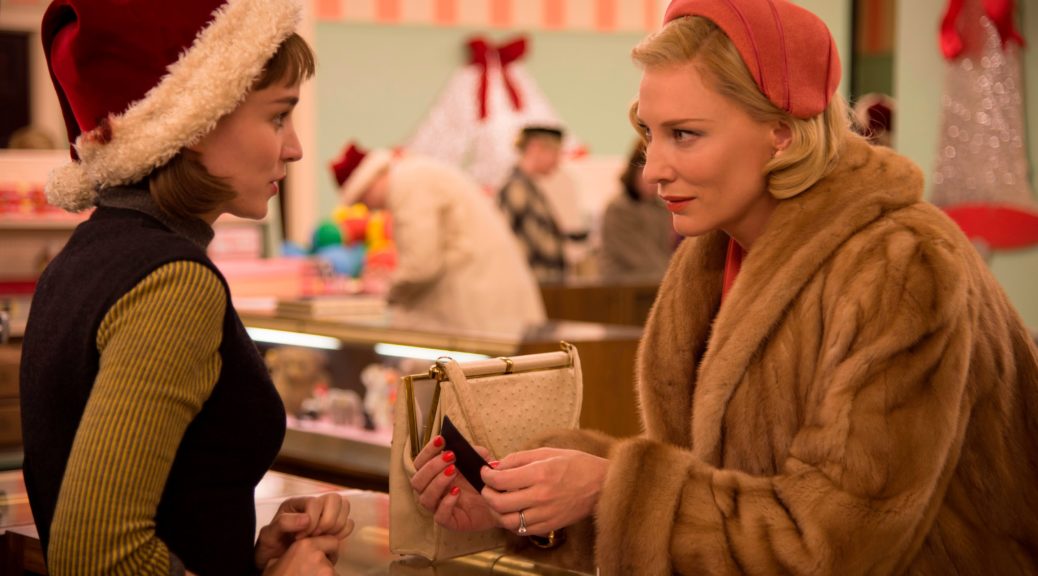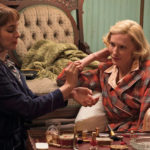You can easily see why the Todd Haynes movie Carol earned as much praise as it did, including a 10-minute standing ovation at the Cannes film festival. You can also see why it was nominated for 6 Oscars, though to end up failing to win any, while harsh, perhaps speaks of the prejudices of The Academy and also the flaws of the movie, of which more later.
It’s easy to speak of the virtues of this film by comparison with others sharing equivalent virtues. The opening scenes in Frankenberg’s department store approaching Christmas in 1952 jumped out at me; here, I said to myself, is a downbeat re-enactment of the delightful Miracle on 34th Street, cast with a green filter and restricted palette, and none the worse for that.
How so? Because there is the same veiled air of magic, despite the desperation among the staff and shoppers alike, all attired in Santa hats. All you need is Edmund Gwenn to appear as Santa and the illusion would be complete.
Then there is the slow-burn eroticism of the initially unspoken relationship between Rooney Mara‘s shopgirl and would-be photographer Therese Belivet and the older, sophisticated Carol Aird, played by Cate Blanchett. It strongly reminded me both in tempo and eroticisim of of A Single Man, where Colin Firth‘s grieving lecturer has a charged encounter he chooses not to progress.
Both films explore gay relationships set at a time when these were neither legally nor culturally acceptable. In this adaptation of Patricia Highsmith‘s semi-autobiographical novel The Price Of Salt, it is Aird’s husband Harge (not a name I’ve ever heard before) who calls into questions his wife’s morality during their divorce proceedings, and therefore that she should not be allowed shared custody of their daughter, a jarring injustice that you would hope the courts would never permit these days.
The gay aspect is not discussed at any length, and there’s no reason why it should be. This is a film about two women, one of whom has previously had an affair with another woman, who fall in love with one another. That they are both female, contrary to the beliefs of a disapproving society, is almost irrelevant, in the same way that it is not relevant in 1960s America for A Single Man.
Harge is played by Kyle Chandler, an actor midway between a young Richard Burton and Ricky Gervais in looks, one who does a good turn as pantomime villain in this case. Look out too for Cory Michael Smith, who put in a great turn as Edward Nygma in Gotham and adds the same sinister charm as a travelling salesman who is more than he seems.
However, for acting honours you need to look no further than the central duo. Mara is very good, but Blanchett is phenomenal. Like a butterfly she has transformed from a dazzling young talent to an exceptional mature actress. Look how she always has time and space on screen, the mark of an actor with presence. She fills the screen and conveys way more than the words of the script actually say (in fact, the actors removed a number of superfluous lines, thus demonstrating less can indeed be more.)
Blanchett’s performance is that of a consummate professional. Even in the love scene between Aird and Belivet, never once do you even conceive she is acting. Mara too handles the scene with aplomb, such that you can feel the emotional intensity as much as the physical gratification.
But this is where I detect a flaw in what is otherwise stunning movie. Not the look and feel, for sure: the authenticity of production design and the cinematography of Carol are second to none, such that to my mind both deserve all the gongs for which they were nominated.
Nope, I’m talking about narrative structure. While there is the sexual tension buzzing between Aird and Belivet, the audience is rightly hooked. The scene where they make love is, for all the passion and the eroticism of the moment where Blanchett opens Mara’s gown like a child unwrapping a Christmas present, is strangely unerotic and uninvolving, but it also marks a downturn in the structure of the story.
OK, so Aird abandons her lover, until very near the end, so you would expect the mood to turn cold, but it is more than that. There is nothing left to entice you to retain interest in the characters or the movie. It is as if the balloon has been stabbed and air spurts out, leaving the rubber to waft down to the ground. I too, felt a little deflated and lost attention.
The magic that makes the film compelling has dissolved, such that all we are left with are people trying to get on with life. Of course the film ends with the promise of a rapprochement, such that it can finish on a high note, but by then the damage is done, the pace has dropped and the world has moved on. I find that such a shame, but I would not be at all surprised if it was the same feeling that disappointed members of The Academy.
For all that, I would strongly recommend anyone to see Carol, notably for the beautiful, beautiful depiction of unspoken love, almost oozing from the pores of both parties, and for the best recreation of 1950s America you are likely to see anywhere.













